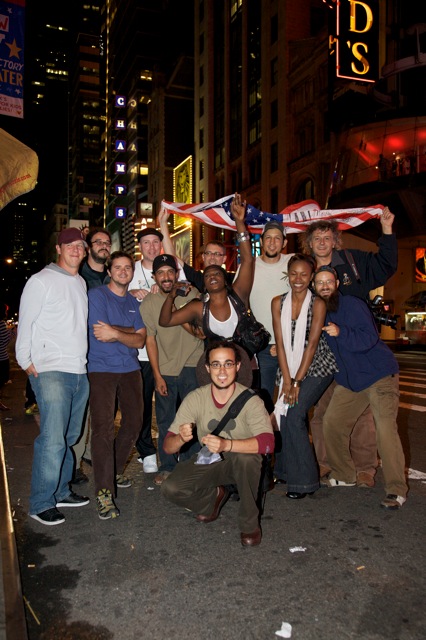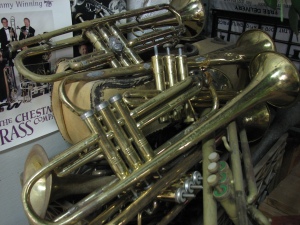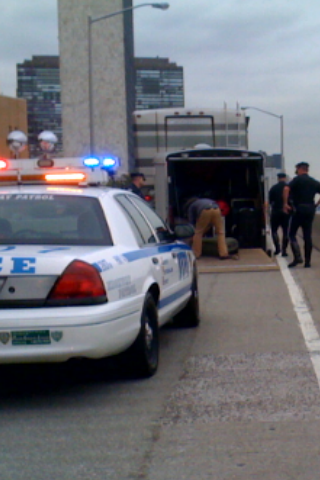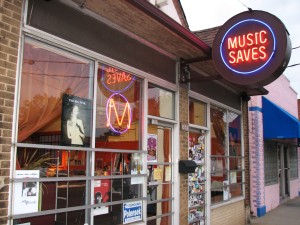Cleveland, Ohio
September 29, 2009

Groundation in New York
Wednesday Sept 23rd, 2009
Dropping in on the General Assembly; The vicissitudes of road life; We don’t need no stinking air conditioner.
We’re finally in Cleveland, looking forward to our first day off after eight shows in a row. Our second show in New York went well, at Sullivan Hall down in NoHo. After the show the fans constituted a four to one girl to guy ratio, so spirits were high. The next morning I hopped the C and F trains to the Brass Lab in Chelsea and got my horn fixed by the crusty fellow that works there. He fixed my busted bell in no more than seven minutes and charged twenty bucks for it. Then I went back to meet the bus in the Bowery. A friend of Kim’s who owned a restaurant brought us two big cardboard boxes of rice, potatoes, spicy fish and braised oxtail for which I was deeply grateful, and I threw a plate of that down right on top of a chicken mole sandwich from Cafe Habana.

Dead trumpets at the Brass Lab, NYC.
“Take FDR Drive.”
“I don’t think we’re supposed to go that way.”
“We’re taking the FDR.”
That was the conversation that occurred just minutes before our RV was surrounded by the police seven hundred meters from where the president of the United States was meeting with Middle East leaders at the the United Nations General Assembly. We sat on the curb of the expressway under guard and watched diplomats fly past in bullet proof limousines, while gunboats patrolled the East River. We watched our driver get arrested, handcuffed and put in the back of a police cruiser.

The United Nations is on the left. Photo by Iron Ryan.
“Merry Christmas. You can be on your way,” said the officer after forty-five minutes or so. “By the way, what kind of music do you guys play?”
“It’s a fusion of reggae and jazz and funk,” said Mingo.
“Oh yeah? You guys like the Black Eyed Peas?”
Our show in New Haven Connecticut, was a little sad because our friend and roadie was in a New York City jail, and the show was lightly attended, which was too bad, because we played a passionate set, and the opening band was top-notch. The Big Takeover has a powerful sound grounded in a core of of reggae classics. Toad’s Place treated us with respect, which just goes to show that you don’t need a big crowd to have a good show.
Later that night, as the RV wound its way back down through the northern suburbs of New York, the conversation went something like this:
“What’s the vertical clearance on this RV?”
“It’s like thirteen feet, why?”
“I think that sign said eleven feet.”
“What’s that one say?”
“Ten and a half.”
“There’s another one ahead. What’s it say?”
WHAM!
We left an air conditioning unit and a half lying somewhere in the vicinity of the Cross-Bronx Expressway. After they hit the overpass at seventy miles an hour, the departing air conditioners knocked the access ladder halfway off the back of the vehicle and left two gaping holes in the roof. Today it rained. Hello, Cleveland!

Waterloo District, Cleveland.
P.S. I wanted to mention at some point that we played with Junior Marvin at the State Theater in Falls Church. Junior Marvin was guitarist in the Wailers from 1977. At the Virginia show he rocked hard, putting Harrison’s guitar pedals through their paces, and sang a while on Marley’s “Exodus”. Nobody in the band could believe he was old as he said he was. Jamaicans do not age normally. This is one of the things I’ve learned playing reggae music.
“Diesel” Dave Chachere
New York, New York
September 21, 2009
Back to the old school; US press briefly takes note of Groundation; The dreaded music biz and what it’s really all about; wedding band fan club.
If Nostradamus had appeared to me in 1983 while I was riding around in my parents’ Toyota listening to UTFO and told me that I would, at the advanced age of 42, be opening for round-the-way rapper Big Daddy Kane and Full Force, the producers of “Roxanne Roxanne”, in New York, I would have laughed in his medieval face. Nonetheless, Groundation pulled into Times Square around seven o’clock on Friday evening and parked the old RV in front of B.B. King’s Blues Club on 42nd Street. When the NYPD inevitably wandered up, they were so impressed we were on the bill with some of the Bronx’s hip hop laureates, they put away the citation book and let us park there all night. I have to admit there was a rather strange energy in that club, I imagined I was damn near the only person in the world that thought Groundation and Big Daddy Kane together were a good bill. Heartbreakingly, we had to drive out before the famous rapper took the stage in order to get to our next destination, outside Boston.

Nobody parks on 42nd on a Friday night except OGs.
I snuck “Autumn in New York” into my solo on “Hebron”, but I felt like I never really touched ground in the real city. As most folks know, Times Square in no longer a real part of New York City. When I first visited that neighborhood it was swarming with transvestites and hustlers, but all that’s been replaced by monumental corporate neon. It’s as bright as Disneyland. Main Street USA on steroids. Still, for my money, New York City is the greatest city on the planet. It’s pretty much solid excitement, it’s everything you want available for you all the time. It makes people, it destroys people; in my opinion it’s the real face of this country.

The tour manager never sleeps.
This weekend Groundation’s name appeared for (almost) the first time in the mainstream American press. The constant roving nonsense of the entertainment industry is going to be cluttering up our yard for a while. There are going to be some lawyers and whatnot. If you’re a Groundation fan I probably don’t have to say a word about it; if you don’t know what I’m talking about, you will soon enough. There’s important business going on for us that’s been a long time coming. When drama comes calling, be prepared to stay up late my nanny used to say. Rest assured, as a group we stand firm in the face of Babylon’s turmoil.
Besides Dave Matthews, the Black Eyed Peas were the most famous headliners at the OutsideLands festival where Groundation kicked off its coast to coast US tour. I hoped to get backstage, but security didn’t like my bracelet, so I took a couple of pictures of Fergie and Will.i.am over the fence. Then Gabriel, the cat I was hanging around with, started chatting with Jeff Coffin the current saxophonist for the Dave Matthews Band. He got us past security, but we were stopped again at the stage. I walked around and watched from out in the crowd for a few minutes, but decided to have dinner rather than watch their show on an empty stomach.
Big time, small time, independent, or major label contracts. This is what they talk about in music business trade magazines like Billboard. Serious business, people; Big money business. If you like to eat sausage, you should avoid learning about how it’s made, and the music business is no different. If you really love music, learn to play, learn to jam, play in a band, get as good as you can and play shows. Sing and dance with your friends and family, especially your kids, have fun, express yourself, celebrate life. That’s what music’s for. Looking at the pictures in Rolling Stone or playing Rock Band or watching the 100 Raunchiest Backstage Scenes on VH1: these are pale shadows of the raw, untapped energy of music. Though it is idolized and fetishized on an unprecedented scale, people have surrendered music in their own lives, leaving it to professionals. Sometimes it feels less like a joyful expression and more like a talent show held in a shopping mall.
In fact, it’s worse than a talent show, it’s a popularity contest. Meanwhile, the music itself is buried under mountains of words and images, sealed off inside iPods, TVs and computers, like a chocolate cake wrapped tightly in plastic. But despite all that, it speaks for itself, in its own unintelligible language. We can’t escape its fascination. It’s an essential element in all our social occasions from playing “taps” at military funeral, to church services and weddings. If there is a god, music is the language in which he would speak.
I’ve performed at my share of weddings, including my own, and while some musicians consider this kind of work debasing, I’ve always loved it. The pay is good, the food is good, and you get to provide the one thing people crave the when they’re savoring the joy of life: a spirited Kool and the Gang Medley.
Weddings are bread and butter for many musicians, and an honorable life it is. For every band like The Peas and Dave Matthews there are thousands of dues payers out there. And there are the little vocal groups, the garage bands, the streetcorner cyphers, and the weekly karaoke regulars: people who never play their guitars through anything louder than a pair of headphones.
In all honesty, to quote an old friend, I love my job, and it’s a luxury to be able to say critical things about a tradition that’s put food on my table for years. The music business even put my wife through graduate school. Humbleness is the only appropriate attitude when speaking about music, whether you’re a student or a master. People in the jazz community like to talk about how important it is to “support jazz music”. The way I see it, the suggestion that music needs our support is like saying that the earth needs our support to continue orbiting the sun. Though humans and parrots are the only species on the planet known to respond to music, it is a fact that music exists whether we exist or not. Music is an infinite matrix of complex physical manifestations of energy, an extraordinary symbolic system which our strange brains are profoundly attuned to. Why is this true? Who knows? Who cares? Enjoy it to its fullest, just like you should other pleasurable things in your life.
Enough for now. Keep in touch, people. Thanks to those of you who voted for my writing contest entry. I’m not going to win it, but I enjoyed giving it a fair shot. Burlington, Vermont, you’re next. See you tomorrow night.
‘Diesel’ David Chachere
September 20th, 2009
Orlando, Florida
September 9, 2009

Backstage at the club...
Second US tour begins; The Big Easy; Lost in the shadow of Disney World; Festivals and headliners.
Florida is a unique place. Besides Las Vegas, it’s got the fastest growing population in the US, where vast wetlands are drained to make way for golf courses, housing complexes, and strip malls. People here come from all over US and the Caribbean. Our first show in Florida this year is here in Orlando, home of Walt Disney World. Like much of America, it’s a place built largely on fantasies conjured out of an inhospitable wasteland.

Bats: Keeping Austin free of insect pests since five million b.c.
One of the first shows of our 2009 US tour was in Austin, Texas, a real playground for music fans and musicians, with dozens of great clubs. Each night at dusk one and a half million Mexican freetail bats emerge from their home under the Congress Street Bridge and go off to their gigs playing bass in alternative rock bands. Our next stop was New Orleans, whose musical pedigree is known to everyone. Our hotel was directly across the street from Louis Armstrong Park, not far from the Ninth Ward where the great trumpeter grew up.
The story of American music begins in New Orleans, in places like Congo Square, where African traditions met with European instruments and styles to create the fusion which is the root of it all. Reggae’s origins in colonial Jamaica are similar, and the early Jamaican styles like ska influenced and were influenced by their Northern neighbors.

Katrina-Proof: Trombone Shorty from NewOrleans
New Orleans is no longer the city it was in the days of Storyville, when musicians like Satchmo and Jelly Roll Morton honed their skills elbow to elbow with pimps, prostitutes, and drunken sailors. It’s a still a pretty wild town, and the music scene is thriving, even after the disaster of Hurricane Katrina, but most of the rough edges have been smoothed out. Children still tapdance and play trombone and clarinet on the street for spare change, and the locals, when you can actually find them, still have a lot to teach the rest of the country about hospitality and enjoying life.

Ghosts of Mardi Gras' past.
When I say it’s no longer the city it once was, what I mean is this: the charms of the city have been packaged like the other commercial products that drive the American economy. What is that nonsense about? It’s about advertising. It’s about marketing, capital investment, structures of business integration. It’s about money, risk analysis and the selling of culture. I’m not talking just about t-shirts and beads, I’m talking about a whole industry designed to sell our own culture back to us at a profit. I’m talking about the fact that there’s no real difference between the Vegas Strip, Bourbon Street and Disney World anymore.

- The Life of Ignacius Reilly: an enduring New Orleans tradition.
This commercialization doesn’t just affect the culture, the commercialization becomes the culture. Everyone knows this, and many people just accept it: The Grammies, Billboard sales charts, platinum records, America’s Got Talent, MTV and the Eurovision Song Contest. This is music for many people, so lost from its social origins it’s barely recognizable anymore. Sales figures repace poetry, and tabloid soap operas receive more attention than the music itself. Soul, passion, innovation, creativity: these have become secondary.

Dave Matthews at Outside Lands
The first show of Groundation’s 2009 US tour was at OutsideLands, the largest festival in my hometown of San Francisco. The headliners on Saturday were the Dave Matthews Band and the Black Eyed Peas. After Groundation’s performance I enjoyed Dave Matthews’ show from out in the crowd with my wife Gillian and some new friends. From that distance Matthews himself was tiny, dwarfed by the high-definition digital projection of his own image which loomed behind him. While few musicians match the heights of his success, I think Matthews’ career is fairly typical in some ways. He started at the bottom, practicing and playing in small bars and clubs, paying dues, working his way slowly up the ladder to increasing rewards. I think the measured pace of his ascent has allowed him to keep his head level.
Earlier this year Groundation opened for another icon of the current pop music scene, Kanye West. In Europe, it’s not uncommon for independent bands like Groundation to be treated equally with corporate-backed giants like the Chicago rapper, who is almost as famous for his egotism as for his music. We were all looking forward to hearing whether he had the talent to back it up.
The backstage in Belfort, France was fairly lavish, and we were all enjoying ourselves: eating, drinking and socializing with Kanye’s band and crew as well as Dublin rockers The Answer and Olivia Ruiz and her group. A few minutes before schedule, amid an air of hushed expectancy, a fleet of white SUV’s pulled up, and Mr. West stepped out, wrapped safely in a cloak of security guards. He never actually entered the backstage area, but was brought directly to the stage, apparently so he wouldn’t have to meet or talk to anyone. During most of his time on stage he perched atop a sort of pillar, while his half-band (most of the music was prerecorded) toiled in the shadows behind him. At a certain point four dancers, stark naked and covered in gold paint, emerged. This should be interesting, I thought, but I was to be disappointed. The dancers struck poses of worship at West’s feet and stood motionless for the duration of the song, after which they had a brief stretch before resuming their function as stage props, finally exiting the stage somberly after ten minutes’ work as living mannequins.
Kanye West’s music is popular for a reason, it’s very catchy, and his self-confidence inspires respect, even when there seems to be little substance behind it. Many of the young people in the audience probably didn’t realize that a large proportion of the music West ‘performed’ was written by other people. One of the most recognizable samples was PYT (Pretty Young Thing) by Quincy Jones and James Ingram. Who? You might not know their names of the cats who wrote the song which was made famous by Michael Jackson.
The members of the band were shocked by Jackson’s recent death. Musicians all around the world were performing his music as tribute, and Groundation was no exception. I worked passages from “Off the Wall” into the live introduction to our song “Jah-Jah Know”. Once, the whole band spontaneously started playing Billie Jean. We call like to call this ‘quoting’. Jazz musicians often insert meaningful (or just whimsical) melodies into their solos: pieces of Christmas carols in the holiday season, for example. I remember working ye olde melody “Yankee Doodle Dandy” into a solo on July 4th during our US tour in 2008. Kelsey and Ryan often quote reggae classics in their improvisation. It’s different from playing a version or a cover, and it’s definitely different from sampling. It’s just something that jazz players have always done. It’s a sort of playful thing, a challenge, part of the fun of improvised music.
I have to wonder whether music was much fun for Michael Jackson in the years before his death. He was a talented artist who clearly suffered a great deal, and he left a mixed legacy, but one of the things that we will remember is his failure to cope with fame. It’s like being lost in a hall of mirrors, where all you can see are distorted reflections of yourself. The connections of love and commitment between individuals vanish and become a one way ticket to isolation and vanity. This can happen to almost anyone, and I think people who find sudden fame are especially vulnerable, because they haven’t had the time to build up the inner strength to resist fame’s pitfalls. The result can be traumatic: breakdowns, burnout, drug addiction and alcoholism, all of which are prevalent in the music business.
Elvis, Michael, Britney Spears, all of them were deceived by the modern music business. It’s really no different from the fantasy that’s sold today as the American Dream: getting rich quick without having to earn it. Its a fantasy designed to insure our complicity in the mechanisms of our economy, and one that serves to keep people in line, isolating them, turning everyone into competitors rather than collaborators, keeping space limited on the top, making sure there are always plenty of vacancies on the bottom. For myself, I tend to think that anything worth having requires hard work, plus talent and a bit of luck. For me, many of the guys up there on the big screen are little more than figureheads, no different from the corporate logos that permeate our cultural landscape.
At the end of Kanye West’s performance, the backstage was momentarily cordoned off by a platoon of security personnel while the diva was swept away to his hotel room, or wherever. Harrison said something very poignant to me at that moment, something like this: if Kanye isn’t careful, he’s going to end up just like Michael: isolated, lonely, a monster, an outcast.
Meanwhile the corporate machine chugs on, trotting out one new star after another and letting those that aren’t strong enough fall by the wayside to be trampled by the tabloids. Perhaps it will happen to Kanye West, who knows?
But what did corporate sellouts ever do to you, Diesel Dave, to deserve your derision? That’s a pretty good question, but you’ll have to wait about a week for the answer.